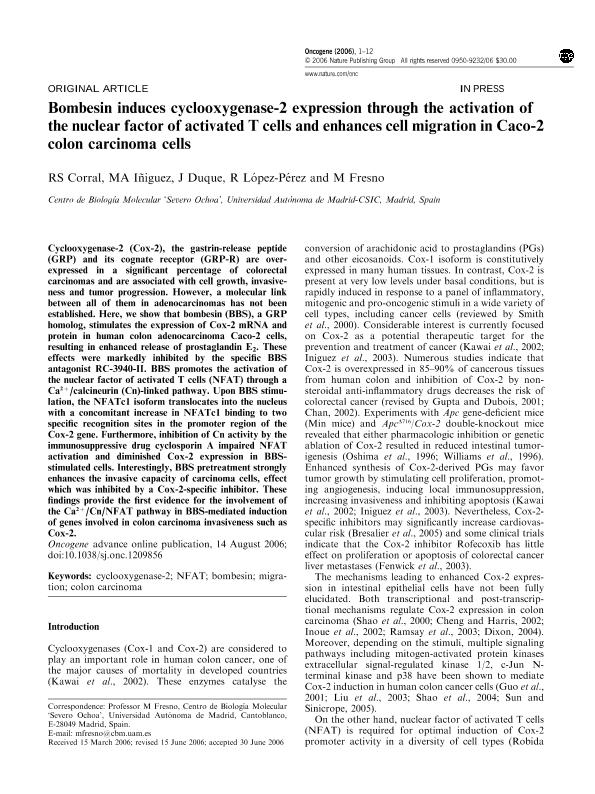Artículo
Bombesin induces cyclooxygenase-2 expression through the activation of the nuclear factor of activated T cells and enhances cell migration in Caco-2 colon carcinoma cells
Fecha de publicación:
02/2007
Editorial:
Nature Publishing Group
Revista:
Oncogene
ISSN:
0950-9232
Idioma:
Inglés
Tipo de recurso:
Artículo publicado
Clasificación temática:
Resumen
Cyclooxygenase-2 (Cox-2), the gastrin-release peptide (GRP) and its cognate receptor (GRP-R) are overexpressed in a significant percentage of colorectal carcinomas and are associated with cell growth, invasiveness and tumor progression. However, a molecular link between all of them in adenocarcinomas has not been established. Here, we show that bombesin (BBS), a GRP homolog, stimulates the expression of Cox-2 mRNA and protein in human colon adenocarcinoma Caco-2 cells, resulting in enhanced release of prostaglandin E2. These effects were markedly inhibited by the specific BBS antagonist RC-3940-II. BBS promotes the activation of the nuclear factor of activated T cells (NFAT) through a Ca2+/calcineurin (Cn)-linked pathway. Upon BBS stimulation, the NFATc1 isoform translocates into the nucleus with a concomitant increase in NFATc1 binding to two specific recognition sites in the promoter region of the Cox-2 gene. Furthermore, inhibition of Cn activity by the immunosuppressive drug cyclosporin A impaired NFAT activation and diminished Cox-2 expression in BBS-stimulated cells. Interestingly, BBS pretreatment strongly enhances the invasive capacity of carcinoma cells, effect which was inhibited by a Cox-2-specific inhibitor. These findings provide the first evidence for the involvement of the Ca2+/Cn/NFAT pathway in BBS-mediated induction of genes involved in colon carcinoma invasiveness such as Cox-2.
Palabras clave:
BOMBESIN
,
COLON CARCINOMA
,
CYCLOOXYGENASE-2
,
MIGRATION
,
NFAT
Archivos asociados
Licencia
Identificadores
Colecciones
Articulos(SEDE CENTRAL)
Articulos de SEDE CENTRAL
Articulos de SEDE CENTRAL
Citación
Corral, Ricardo Santiago; Iñiguez, M. A.; Duque, J.; López Pérez, R.; Fresno, M.; Bombesin induces cyclooxygenase-2 expression through the activation of the nuclear factor of activated T cells and enhances cell migration in Caco-2 colon carcinoma cells; Nature Publishing Group; Oncogene; 26; 7; 2-2007; 958-969
Compartir
Altmétricas




